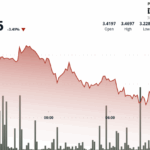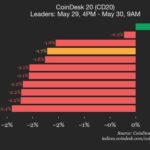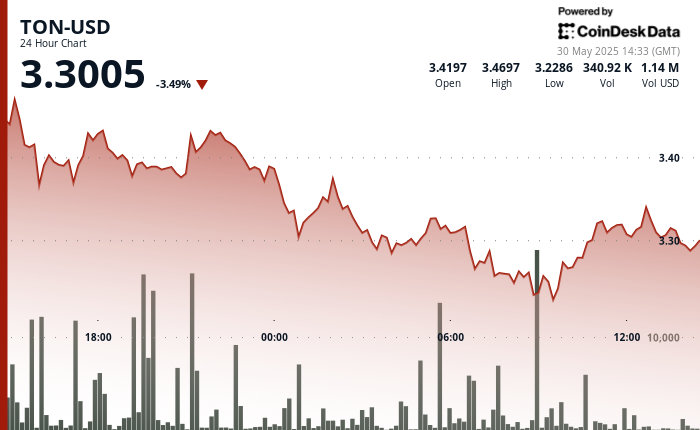
Tether Promises Leadership in Bitcoin Mining as Politicians in Pakistan and the UK Aim to Boost Bitcoin Reserves
Las Vegas takes on a unique shimmer when a crowd of thirty thousand bitcoin enthusiasts fills the luxurious hallways of the Venetian, with screens presenting a lively $105,000 to $106,000 range for BTC, and every coffee line animated with chatter about “hash-rate.”
While typical three-day events often descend into chaos, this gathering sharpened its focus on a singular topic: discussions have risen above mere questions of legitimacy. Governments, regulatory bodies, and major corporations are now actively competing for dominance in areas like integration, taxation, and monetization.
“Tether is set to become the largest Bitcoin miner globally,” Paolo Ardoino declared, highlighting a staggering $13 billion in profits and announcing the company’s ownership of over 100,000 Bitcoin, before delivering a maximalist haiku: “Bitcoin is perfect, gold is imperfect.” Investors greeted the news of an additional $2 billion allocated to energy projects, realizing that a stable-coin powerhouse is shifting from mere liquidity services to actual infrastructure development.
Bitcoin as a Tool for Political Campaigning
Among a sea of international flags, Pakistan’s Special Assistant Bilal bin Saqib proclaimed, “Today, the Pakistani government will establish its own Bitcoin strategic reserve … we commit to holding these Bitcoins without selling them,” supported by a promise of 2 GW of excess mining power.
Cheers erupted when Nigel Farage stepped onto the stage, humorously noting, “We are the first political party in Britain to accept donations in Bitcoin,” and endorsing a draft law that would slash crypto capital gains tax to 10%. He also proposed a “Bitcoin digital reserve” within the Bank of England. The crowd reacted enthusiastically, partly for the policies and partly for the rare sight of a veteran politician courting cryptocurrency backers. Farage depicted the stagnation in Westminster as an opportunity for a crypto-centric populist movement, envisioning a “crypto powerhouse” future.
Nevertheless, with only five Members of Parliament and recent polls showing him at the bottom of the list of preferred Prime Ministers, the true significance lies in his ability to elevate the discourse regarding Bitcoin’s importance among mainstream political parties.
The regulatory atmosphere appeared to soften as well. SEC Commissioner Hester Peirce acknowledged, “We must cultivate a favorable environment for legitimate actors and a hostile one for those with bad intentions,” cautioning that unclear enforcement drives innovators abroad. She later emphasized that “we can’t dismiss it… value will inevitably be integrated into conventional financial products.” Her pointed comment to speculators, “If you’re looking to gamble, go ahead… but don’t bring your complaints to the government,” garnered laughs but indicated a shift from obstruction to the crafting of regulations.
Bitcoin’s Technical Progress Takes a Backseat to World Records
Developers matched the evolving policy landscape. Marco Argentieri, CEO of Ark Labs, introduced Arkade, detailing how it “virtualizes Bitcoin’s transaction layer into an agile financial platform enabling instant operations,” negating the need for sidechains or wrapped tokens. Early collaborators include wallet applications and stable-coin giants, with a launch planned for Q3, promising a programming experience that enhances the foundational layer.
Even the event organizers sought to make headlines by attempting a GUINNESS WORLD RECORD for the highest number of Bitcoin transactions in a single day, creating an on-chain celebration that fit well with the conference’s focus on hashing and policy. Attendees gathered around volunteers wielding signs reading “tap here, stack sats,” eagerly participating in micro-transactions, showcasing the network’s culture as a blend of engineering enthusiasm and lively celebration.
As participants exited into the Nevada twilight, some might have observed that the narrative now resembles urban development more than revolutionary fervor; issues like zoning regulations, tax codes, and energy infrastructures have become the new arenas of battle. While this marks a form of progress, it does raise speculation that the bitcoin community may miss the thrill of rebellion as bureaucratic processes set in.
Noteworthy Moments from Bitcoin 2025
Michael Saylor’s keynote on the first day of Bitcoin 2025 was a major highlight. His talk on “21 Ways to Wealth” was particularly impactful on Industry Day. Saylor emphasized Bitcoin as a revolutionary financial asset and urged corporations to consider it a primary treasury reserve.
He advised, “Convert your fiat currency to Bitcoin… dispose of your bonds, sell your inferior real estate assets, and invest in Bitcoin,” reflecting his strong belief in Bitcoin’s superiority over conventional assets.
In another prominent moment, Vice-President JD Vance outlined a Strategic Bitcoin Reserve as a foundation for American resilience, asserting that financial independence now overshadows the fear-mongering typically seen in Washington.
Miles Suter followed, showcasing a Square-powered demonstration, asserting, “Bitcoin isn’t just a store of value anymore; it’s a means to sustain one’s life.” A discussion featuring Donald Trump Jr. and Rumble CEO Chris Pavlovski then framed the intersection of uncensorable money with uncensorable media as part of a cultural struggle.
Vlad Tenev, the founder of Robinhood, discussed a future where AI enables single-person companies and tokenized ownership, claiming that unrestricted capital will disrupt established barriers just as Bitcoin transformed remittance fees.
Lastly, White House crypto advisor David Sacks reminded attendees that presidential authorization already exists, stating, “If the Treasury or Commerce can figure out funding without increasing debt, they are permitted to develop those programs.”
Despite all the posturing, the U.S. Bitcoin strategic reserve remains a commitment to refrain from selling seized Bitcoin rather than a proactive monetary policy. Essentially, if the government appropriates your Bitcoin, it won’t flood the market, but there is still no established policy for actively acquiring Bitcoin.
Is Bitcoin Still Cypherpunk?
There’s a nagging unease that the keynote speeches leaned heavily toward Bitcoin promotion and political maneuvering at the expense of protocol advancement, security, and decentralization. I fully support efforts to raise awareness around Bitcoin’s value, yet I question how effectively the conference’s leading figures are achieving this.
Indeed, while the main talks invigorated the American Bitcoin community, I worry we may be drifting further from the original cypherpunk spirit that birthed Bitcoin. Politicians with limited governmental influence continue to leverage Bitcoin for political gain, while corporations proudly display their Bitcoin holdings.
Is this still Satoshi’s vision? I believe so, but we must consistently remind ourselves of the values that drive our passion for Bitcoin and whether we are genuinely working to bring in the next billion users or merely celebrating the current price surge.



















Post Comment